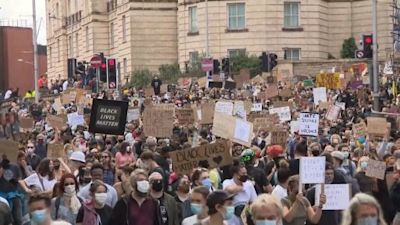Black Lives Matter: How has the worldwide movement affected Bristol?

Report by Alpha Ceesay
The toppling of slave trader Edward Colston's statue during last month’s Black Lives Matter protest drew worldwide attention.
It led to calls for the removal of other historic statues across the region and beyond, sparking a national debate about how we remember our past.
More than a month on from that day those within Bristol's black community say its impact has been felt but more needs to be done.
One of the organisers of the protest, Yvonne Mania said the movement has helped highlight the experiences of the city's minority communities.
Poet and activist Solomon O.B. delivered a speech at the protest on Sunday 7 June calling for it to lead to a movement and not just be another moment. He said he feels the movement has the potential to make real change but it is still too early to say.
He said, "The conversation is firmly on the table now. Before it was very easy for people to be like this doesn't affect my life, or this is awkward, so I'm not going to talk about it.
"But I feel like the more that we speak and the more that we realise it's not just me that sees the situation this way or that I can see where someone else is coming from, anything can grow from that."
The Let's Talk show on Youtube aired its first episode a week after the protest. Created by the Babbasa youth organisation it aims to give Bristol's youth a platform to share their views on issues affecting them, such as the Black Lives Matter movement.
Bristol's history of campaigning for equal rights
In 1963 the Bristol Bus Boycott helped pave the way for the UK's first laws against race-based discrimination.
Guy Bailey, one of the men who sparked the movement, told ITV News he is disappointed that not as much progress that could have been made, has been made in recent years.
"I have been heartened by recent protests because now there is real pressure on authorities to step up and work for equality, he said."
"We need to do what we can to get real change for our children and great-grandchildren to be able to live in a society that is just and fair for all."
This year also marks the 40th anniversary of the St Paul's Uprising, which was branded a pivotal moment for black communities within Bristol.
Education
Following the protest, several initiatives are set to be introduced in Bristol to further educate people about black history.
Poet Lawrence Hoo is part of a scheme that will introduce a new set of black history lessons in the city’s secondary schools to highlight pioneering black leaders.
The first phase of Cargo Classroom is due to be rolled out to secondary schools in September with learning resources for years 7, 8, and 9.
Bristol City council has also launched a new commission to further understand the city’s past when it comes to racial inequality. Its aim will be to research and share varied stories from communities in Bristol.
A second protest is due to take place at Eastville Park on Sunday 10th July, with thousands expected to attend.
The hope will be to have even more voices heard as the city comes together to try and end racial discrimination.
Read more:
Bristol Mayor Marvin Rees calls for condemns attack on attack on African slave's historic grav
Black Lives Matter protesters turn out for Lydney demonstration
Bristol University set to review building names and logos with links to slave traders
9 year-old Bristol schoolgirl pens emotional poem calling for racial equality